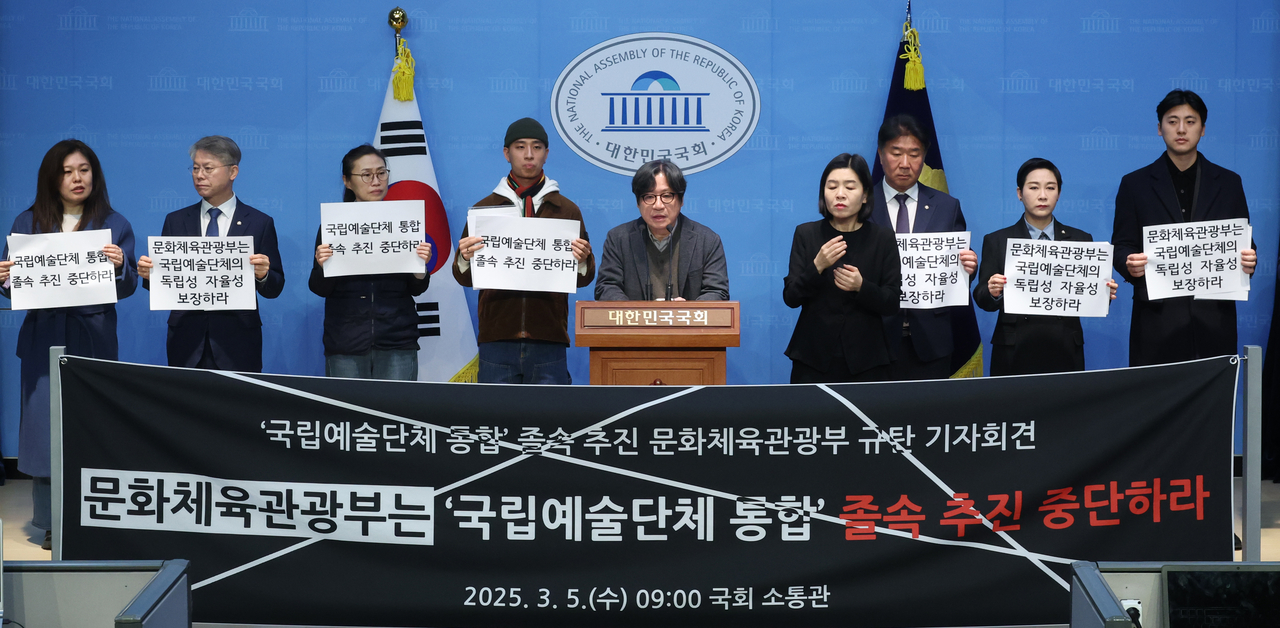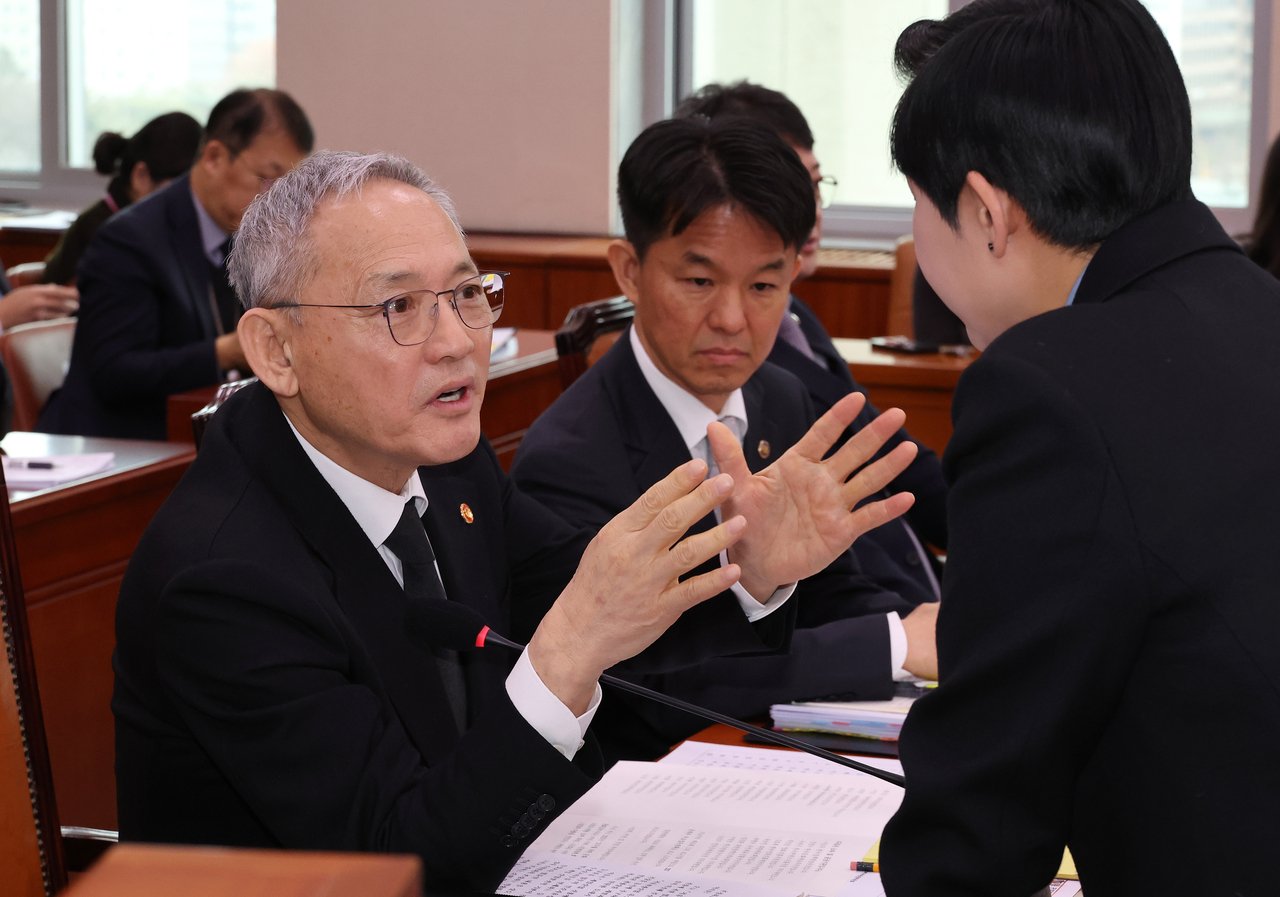As opposition grows against Culture Ministry's plan to consolidate state arts organizations, Minister Yu In-chon hints at possible halt

A group of artists, civic activists, academics and lawmakers held a press conference at the National Assembly Wednesday morning, denouncing the Ministry of Culture, Sports and Tourism's plan to establish an integrated secretariat to oversee five national arts organizations, calling it a hasty and bureaucratic decision.
During a National Assembly session, the culture minister defended the initiative, stating that the goal is to ease the administrative burden on artists while also indicating that the ministry would reconsider if opposition remains strong.
On Feb. 19, the Culture Ministry announced a plan to establish an integrated secretariat within the first half of this year to oversee the administration of five national arts organizations: the Korea National Opera, the National Chorus of Korea, the Korean National Symphony Orchestra, the Korean National Ballet and the Korea National Contemporary Dance Company.
A plan to relocate state arts organizations to provincial cities over the next few years, starting this year, was expected to be announced Thursday.
Wednesday’s press conference was organized by civic groups Cultural Action and After the Blacklist, the Cultural and Arts Council of the Public and Transport Workers' Union, the Korean Federation of People's Arts Organizations and four legislators -- Min Hyung-bae, Kang Yu-jung, Lee Ki-heon and Kim Jae-won -- all opposition party members serving on the Culture, Sports and Tourism Committee.
“The biggest problem is that the ministry is pushing the plan excessively without sufficient understanding or discussion with the respective organizations. It clearly reflects the ministry’s bureaucratic and authoritarian stance toward the cultural and artistic sector. Moreover, each organization has its own budget execution and operational system tailored to its specific genre, and ignoring these differences will not enhance administrative efficiency but instead create confusion,” they said.
Kang Dong-hui, head of the National Art Troupes Branch of the Korean Public Service and Transport Workers' Union and a member of the Korean National Ballet, told The Korea Herald that union members from the Korea National Ballet, Korean National Symphony Orchestra and National Chorus of Korea decided to oppose the integration plan. Additionally, after a meeting on Tuesday, union members from the National Opera and Seoul Performing Arts Company also agreed to join the opposition.
Also at Wednesday's press conference, Lee Dong-yeun, professor of Korean Traditional Arts Theory at the Korean University of Arts, questioned the "hasty" move as well as the timing and lack of rational grounds for the plan "at this juncture when the current administration is on the verge of coming to an end."
Choreographer Oh Hyeon-taek, who opened an online petition “Against the Integration (Merger) of the National Contemporary Dance Company” last month, said that the move is particularly concerning for contemporary dancers.
“The National Contemporary Dance Company, already operating with the smallest budget, risks further cuts under the integration plan, potentially leading to its dissolution. Reduced funding would not only hinder operations but also limit artistic creation and experimentation, ultimately marginalizing contemporary dance as a genre,” Oh told The Korea Herald. Oh’s petition had gathered 1,900 signatures as of Wednesday morning.

Speaking at the Culture, Sports and Tourism Committee session at the National Assembly, which convened soon after the end of the press conference, Culture Minister Yoo In-chon answered questions on the integration plan.
“It is intended to let artists focus on their art without having to handle administrative work, if possible,” Yu said.
Regarding the criticism that it was a move made in haste, Yu said that the ministry had held numerous discussions with experts and stakeholders since early last year.
“If the opposition is very strong, then (we) won’t implement the plan,” Yu said.
During the session, Yu revealed his determination to contribute to achieving regional balance and fulfilling the duty of state arts organizations by relocating them outside of Seoul.
“We have only talked about regional balances but without taking any action. It’s the duty of state organizations. Once the state arts organizations are relocated, a mega city like Seoul and districts in Seoul could make their own arts organizations,” Yu said.
This year, two state arts organizations will be relocated, including Seoul Performing Arts Company, which will be moved to Gwangju City. There, SPAC will become the National Asian Culture Center's resident art troupe.
These relocations and the administrative integration of five arts organizations will be announced Thursday as part of the ministry’s mid- and long-term plans, called "Vision 2035."
Opposition party lawmakers also questioned recent appointments to fill vacant positions at organizations under the Culture Ministry.
Democratic Party lawmaker Lee Ki-heon pointed out that the ministry restarted the process to hire a head of the Korea Tourism Organization on Feb. 9 and at the Korea Creative Content Agency on Jan. 8 after deeming there were no qualified candidates. The position of the presidency of the KTO has been vacant for 13 months, while the Korea Creative Content Agency's top post has not been filled since September 2024.
Lee also pointed to speculation that a high-ranking Culture Ministry official may be appointed director of the National Gugak Center, a position which has been held by figures from the gugak community. Hiring for the director restarted Jan. 2.
Another Democratic Party lawmaker, Min Hyung-bae, highlighted that since the short-lived martial law declaration by President Yun Suk Yeol on Dec. 3, the Culture Ministry has filled 50 vacancies in eight organizations.
Currently, of the 66 organizations under the ministry, leadership positions at 12 remain vacant, according to Min.
On the possibility that acquaintances of first lady Kim Keon Hee could be appointed to the new board of directors of the integrated state arts groups, Yu denied there was any such intention and said the plan for the new board could be abandoned.
gypark@heraldcorp.com




